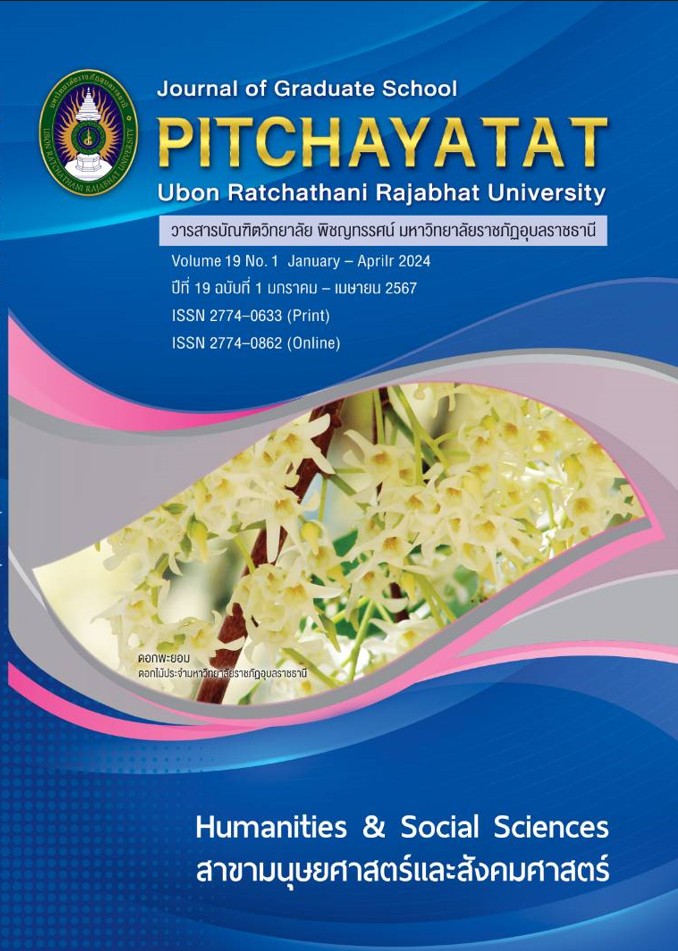รูปแบบการบริหารสู่ความเป็นโรงเรียนอัจฉริยะของผู้บริหารโรงเรียนในสังกัดสำนักงานเขตพื้นที่การศึกษาประถมศึกษาในจังหวัดนครราชสีมา
คำสำคัญ:
รูปแบบ, โรงเรียนอัจฉริยะ, โรงเรียนประถมศึกษาในจังหวัดนครราชสีมาบทคัดย่อ
การวิจัยนี้มีวัตถุประสงค์เพื่อ 1) ศึกษาความต้องการจำเป็นของการบริหารสู่ความเป็นโรงเรียนอัจฉริยะสำหรับผู้บริหารโรงเรียน 2) พัฒนารูปแบบการบริหารสู่ความเป็นโรงเรียนอัจฉริยะสำหรับผู้บริหารโรงเรียน 3) เพื่อประเมินรูปแบบการบริหารสู่ความเป็นโรงเรียนอัจฉริยะสำหรับผู้บริหารโรงเรียนในสังกัดสำนักงานเขตพื้นที่การศึกษาประถมศึกษาในจังหวัดนครราชสีมา โดยใช้ระเบียบวิธีวิจัยแบบผสานวิธี เครื่องมือที่ใช้ ได้แก่ แบบสอบถาม และแบบประเมิน ตัวอย่าง ได้แก่ ผู้บริหารสถานศึกษาสังกัดสำนักงานเขตพื้นที่การศึกษาประถมศึกษาในจังหวัดนครราชสีมา จำนวน 297 คน วิเคราะห์ข้อมูลโดยการหาค่าเฉลี่ย ส่วนเบี่ยงเบนมาตรฐาน และ ค่า PNImodified
ผลการวิจัยพบว่า
- ความต้องการจำเป็นของการบริหารสู่ความเป็นโรงเรียนอัจฉริยะสำหรับผู้บริหารโรงเรียน สภาพที่เป็นจริงในภาพรวมอยู่ในระดับมาก สภาพที่ควรจะเป็นโดยภาพรวมอยู่ในระดับมากที่สุด และความต้องการจำเป็น เรียงลำดับจากค่ามากที่สุดไปค่าน้อยที่สุดดังนี้ ความฉลาดเชิงระบบ ความฉลาดเชิงกลยุทธ์ ความฉลาดเชิงพิเคราะห์ไตร่ตรอง ความฉลาดเชิงบริบท ความฉลาดเชิงวิธีการสอน และฉลาดเชิงวิทยสัมพันธ์
- รูปแบบการบริหารสู่ความเป็นโรงเรียนอัจฉริยะสำหรับผู้บริหารโรงเรียน องค์ประกอบของรูปแบบ 5 องค์ประกอบ ได้แก่ วัตถุประสงค์ของรูปแบบ หลักการของรูปแบบ องค์ประกอบหลักของรูปแบบ การประเมินรูปแบบ และเงื่อนไขความสำเร็จในการใช้รูปแบบ องค์ประกอบหลัก ประกอบด้วย 2 ส่วน คือ 1) ผลลัพธ์ คือ การเป็นโรงเรียนอัจฉริยะ โดยมีคุณลักษณะ 6 ด้าน ได้แก่ (1) ด้านความฉลาดเชิงระบบ (2) ด้านความฉลาดเชิงกลยุทธ์ (3) ด้านความฉลาดเชิงพิเคราะห์ไตร่ตรอง (4) ด้านความฉลาดเชิงบริบท (5) ด้านความฉลาดเชิงวิธีสอน และ (6) ด้านความฉลาดเชิงวิทยสัมพันธ์ 2) กระบวนการบริหารสู่การเป็นโรงเรียนอัจฉริยะ ได้แก่ (1) การกำหนดวิสัยทัศน์และพันธกิจ (2) การนำวิสัยทัศน์สู่การปฏิบัติ และ (3) การติดตามและประเมินผล
- การประเมินการบริหารสู่ความเป็นโรงเรียนอัจฉริยะสำหรับผู้บริหารโรงเรียนในสังกัดสำนักงานเขตพื้นที่การศึกษาประถมศึกษาในจังหวัดนครราชสีมา พบว่ามีความถูกต้อง ความเหมาะสม และความเป็นไปได้โดยภาพรวมและรายด้านทุกด้านอยู่ในระดับมาก
เอกสารอ้างอิง
กนกอร สมปราชญ์. ภาวะผู้นําและภาวะผู้นําการเรียนรู้สำหรับผู้บริหารสถานศึกษา. พิมพ์ครั้งที่ 2. ขอนแก่น: ภาควิชาการบริหารการศึกษา คณะศึกษาศาสตร์ มหาวิทยาลัยขอนแก่น, 2560.
คณะกรรมการการศึกษาขั้นพื้นฐาน, สำนักงาน. หลักสูตรแกนกลางการศึกษาพุทธศักราช 2551. กรุงเทพฯ: โรงพิมพ์ชุมชุนสหกรณ์การเกษตรแห่งประเทศไทย, 2561.
จรัส สุวรรณเวลา. ก้าวสู่องค์กรอัจริยะ. กรุงเทพฯ: สมาคมสถาบันอุดมศึกษาเอกชนแห่งประเทศไทย, 2548.
ชาญวิทย์ ชุมศรี. กลยุทธ์การพัฒนาสู่การเป็นโรงเรียนอัจฉริยะในยุคดิจิทัลสังกัดสำนักงานคณะกรรมการการศึกษาขั้นพื้นฐาน. วิทยานิพนธ์การศึกษาดุษฎีบัณฑิต มหาวิทยาลัยมหาสารคาม, 2564.
ทินกร บัวชู. “ภาวะผู้นำดิจิทัลของผู้บริหารสถานศึกษา The Status of Digital Leadership of Education Management Administrators,” วารสารครุศาสตร์สาร. 13, 2 (กรกฎาคม-ธันวาคม 2562): 294-285.
ธีระ รุญเจริญ. ความเป็นมืออาชีพในการจัดและบริหารการศึกษายุคปฏิรูปการศึกษา (ฉบับปรังปรุง) เพื่อปฏิรูปรอบสองและประเมินภายนอกรอบสาม.ปลัดกระทรวงศึกษาธิการ. กรุงเทพฯ: ม.ป.ท., 2554.
บุญชม ศรีสะอาด. วิธีการทางสถิติสำหรับการวิจัย เล่ม 1. พิมพ์ครั้งที่ 5. กรุงเทพฯ: สุวีริยาสาส์น, 2556.
เยาวเรศ ตระกูลวีระยุทธ์ และคณะ. “รูปแบบการบริหารสถานศึกษาขีดสมรรถนะสูง สังกัดองค์กรปกครอง ส่วนท้องถิ่น,” วารสารบัณฑิตศึกษา มหาวิทยาลัยราชภัฏวไลยอลงกรณ์ในพระราชูปถัมภ์. 9, 1 (มกราคม-เมษายน 2558): 14–15.
วิจารณ์ พานิช. การจัดการความรู้เพื่อคุณภาพที่สมดุล. กรุงเทพฯ: สถาบันส่งเสริมการจัดการความรู้เพื่อสังคม, 2547.
วิจารณ์ พานิช. ผู้บริหารองค์กรอัจฉริยะ ฉบับนักปฏิบัติ. กรุงเทพฯ: สถาบันส่งเสริมการจัดการความรู้เพื่อสังคม (สคส.), 2550.
วีรวุธ มาฆะศิรานนท์. องค์กรเรียนรู้สู่องค์กรอัจฉริยะ. พิมพ์ครั้งที่ 5. กรุงเทพฯ: เอ็กซเปอร์เน็ท, 2549.
ศึกษาธิการ, กระทรวง. คู่มือการบริหารสถานศึกษาขั้นพื้นฐาน. กรุงเทพฯ: กระทรวงศึกษาธิการ, 2546.
สมชาติ กิจยรรยง. บุคลากรอัจฉริยะ. กรุงเทพฯ: เพชรประกาย, 2556.
McGilchrist, B., K. Myers and J. Rees. The intelligent school. 2nd ed. London: sage publication, 2004.
Pinchot, G. and E. Pinchot. The intelligent Organization. Oakland: Berrett-Koehler Publishers, 1996.
Sammons, P., J. Hillman and P. Mortimore. Key Characteristics of Effective schools: A review of school effectiveness research. London: Office for Standards in Education, 1995.
Sydanmaanlakka, P. An Intelligent Organization. United Kingdom: Capstone, 2003.
Teddlie, C. and D. Reynolds. The International Handbook of School Effectiveness Research. London: Falmer, 2000.
ดาวน์โหลด
เผยแพร่แล้ว
รูปแบบการอ้างอิง
ฉบับ
ประเภทบทความ
สัญญาอนุญาต
ลิขสิทธิ์ (c) 2024 วารสารบัณฑิตวิทยาลัย พิชญทรรศน์ มหาวิทยาลัยราชภัฏอุบลราชธานี

อนุญาตภายใต้เงื่อนไข Creative Commons Attribution-NonCommercial-NoDerivatives 4.0 International License.
บทความทุกเรื่องได้รับการตรวจความถูกต้องทางวิชาการโดยผู้ทรงคุณวุฒิภายนอกอย่างน้อย 3 คน ความคิดเห็นในวารสารพิชญทรรศน์เป็นความคิดเห็นของผู้นิพนธ์มิใช่ความคิดเห็นของผู้จัดทำ จึงมิใช่ความรับผิดชอบของวารสารพิชญทรรศน์ และบทความในวารสารพิชญทรรศน์สงวนสิทธิ์ตามกฎหมายไทย การจะนำไปเผยแพร่ต้องได้รับอนุญาตเป็นลายลักษณ์อักษรจากกองบรรณาธิการ





